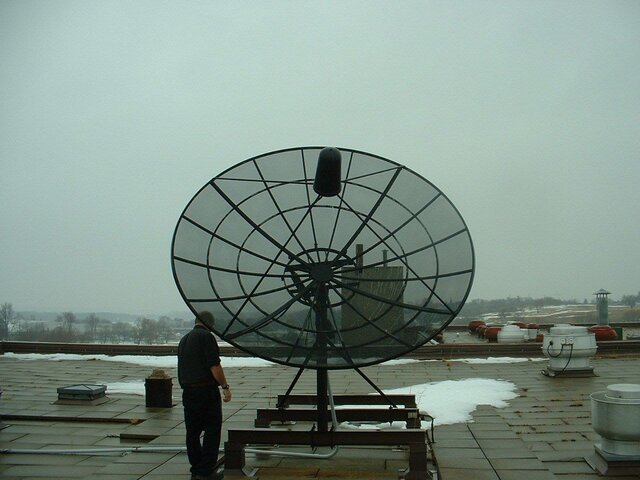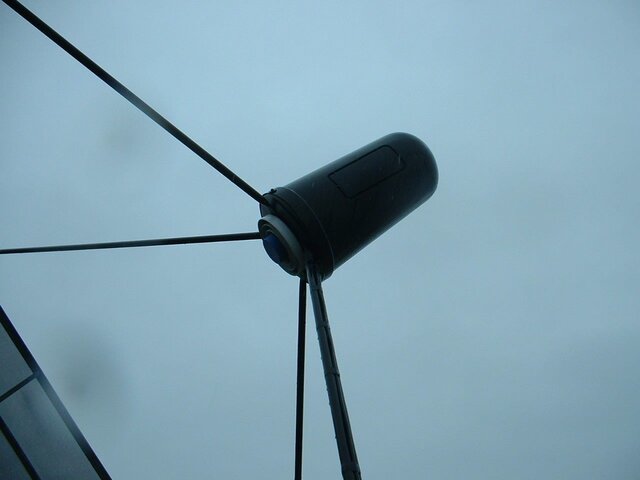Nice looking dish, looks to be in real good shape for it's in weather service time.
Dont confuse analog vs digital with circular vs linear. I 've yet to find a C band lnb (all for analog originally) that wont pick up digital signals. Polarization such as H/V vs circular left or right is another thing altogether, but you will find circular only used for the "pizza pan" aka DirecTV, DN, (or ExpressVu if you are in Canuckland) services.
As to costs, the old cliche "How much you got to spend?" applies here too.
Before posting I had to confirm this still works. The cheap, down and dirty (but legit) way to get one of NASA's channels is to go Ku with any old Dishnet IRD and any old Ku band dish, Direct or DN. Both are for circular polarization. I see them tossed out in the trash quite frequently.
The reason I said 'confirm' is because I picked up an old Dishnet DP301 IRD w/card at a garage sale about six months ago for 3 bucks, and I needed to stop and confirm NASA was still broadcast unencryped on DN before I told you wrong. It is. The hitch is to finding an old box is that, if it is a card using type, it must have the matching card that came with it. No sub is needed but the software wont allow access to the receive functions unless it sees the card present. It is kind of a pain to try to navigate around the 'not authorized' nag that comes up on subscription channels every few seconds until you get to the unencrypted NASA channel (213), but it can be done.
There are models out now that do not have a removable card, it's smartchip is 'embedded' on the main pcb. I suspect they will work for this as well, but I dont have one handy to confirm it. So for a bit of alley canvasing and garage sale/resale shop perusing, one could get NASA (and Angel + the 'barker channels') for next to free. Sounds like a mission/scavenger hunt for the students to me .......lol. With the proper switching setup, adding add'l salvaged boxes for different classrooms is doable as well.
OK, that's Ku. Now, which FTA receiver to add for C (and Ku, as they are dual band) depends on how forward thinking you want to be for the amt spent. A cheap/low end box can be had for around $100 new + shipping and even less if you watch Ebay or Craigs List. Coolsat 5000/6000s are popular, cheap and pretty good on both bands. (I have a 6000)
From here the sky is the limit (pun intended) Up the ante by ~$30 and you can get something with USB/PVR functionality via and external USB mass storage device. They also support .jpg and .mp3 playback,......... useful for presentations? The ability to record/pause/playback a given broadcast should be a useful feature for the classrom as well. Sonicview 360 Premier and CaptiveWorks Ultima fall in this range. There are others.The Sonicview 360 Elite supports dual tuners as well for about 40 buck more. These are on my 'being considerd list' but I am awaiting Echostar's pending encryption upgrade rollout to see how that impacts prices.
I suspect once you enter the DVB arena, you will be exploring much more than the just the NASA offerings. There is considerable educational programming available free-to-air.
The next price step is a considerable one, in the $350-400 and up for HD capable units. A feature to look for here is DVB-S2 capability in addition to the standard DVB-S format. Some HD broadcasts are already using this newer format, more are expected to follow. Some of the units catering to the 'patch-eye' subculture of FTA are not truely S2 compliant.
I believe the Coolsat 8100 and the Pansat 9200 are the only two Asian built boxes available that pick up true S2 out of the box, but you would need to consult someone that has experience with these if they peek your interest.
Good luck, and get those kids out dumpster diving............lol
PS - back to Ku for a moment. If you decide to utilize any FTA box you may get for Ku as well as C band, the Dishnet/DTV pizza pan dishes are usless for Ku linear polarization. You will need a larger, 30"+ dish that has a linear LNB. Remember the old, obsolete Primestar satellite service? The dishes (oval and round) are perfect for Ku FTA, and should be findable on a scavenger hunt as well.............



